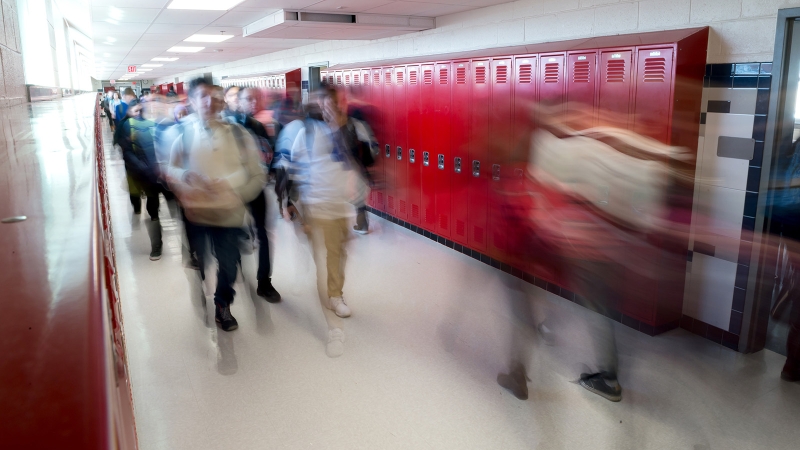
Substance Abuse Prevention Program
FCPS offers activities and learning experiences which focus on the many ways cannabis, alcohol, nicotine/vaping, and other drug use can impact student lives.
Substance Abuse Prevention (SAP) Program
Students who violate the Alcohol, Tobacco, and Other Drug (ATOD) regulation of the Student Rights and Responsibilities (SR&R) take part in our SAP Program.
Students meet with a Substance Abuse Prevention Specialist (SAPS) in school during the school day. The SAPS assesses a student’s level of substance use and provide appropriate level of intervention, which can include:
- Substance abuse prevention education,
- Individual or group intervention,
- Referral to a community behavioral health provider.
FCPS provides students with the most accurate and up-to-date information on substance use, addiction, and treatment. This includes medical, physical, social and psychological consequences. Students learn the tools and strategies they need to stop using these substances, including refusal skills and cessation techniques.
Staff members and parents can refer a student to the SAP program. Students can also refer themselves. A student can take part in the SAP program regardless of whether the student has violated the ATOD regulation in the SR&R.
What does the SAPS do?
Each school pyramid has a Substance Abuse Prevention Specialist (SAPS) assigned to provide substance abuse prevention, education, and brief intervention services.
Some of the duties of the SAPS include:
- Alcohol, nicotine and other drugs education education
- Brief intervention services upon violation of SR&R or suspected substance abuse involvement
- Group and individual prevention services for students, staff, parents, and the Fairfax County community
- Partner with Parent Teacher Student Organizations (PTSO) to provide parent presentations
- Partner with School Resource Officers (SRO) for educational presentations
- And more…
How to Contact the SAPS
Each school pyramid has an assigned SAPS who provides services. If you are interested in scheduling a presentation, please contact your student's school. Front office staff, counselors, or administrators can put you in contact with the SAPS.

In a Few Words FCPS Podcast: Episode 11
Hear Tips on How Parents Play an Important Role in Prevention of Substance Abuse Among Children. Beth Mohaupt and Bryan Villalobos, members of the FCPS Substance Abuse Prevention Team, explain their roles as counselors and gives parents information on how to be proactive in preventing substance abuse among children.
Spanish Podcast: https://anchor.fm/enpocaspalabrasfcps
Arabic Podcast: https://anchor.fm/inafewwordsarabicfcps
Korean Podcast: https://anchor.fm/inafewwordskoreanfcps
Parent Education
As part of the ATOD Intervention Program, FCPS requires the parents of participating students to watch an ATOD education video.
The video helps parents:
- Understand the concept of addictive disease
- Learn reasons young people engage in substance use behavior
- Become familiar with the signs, symptoms, and characteristic behaviors of addiction
- View some of the most popular drug paraphernalia.
- Learn the latest trends in drug use and some of the ways students are obtaining substances
- Learn about available resources for seeking help.
Required ATOD Parent Online Educational Video
This video is required for parents of students participating in the ATOD Intervention Program. It is approximately 1 hour long. Please allow yourself time to complete the video in its entirety. Your completion will be recorded once you have entered your information after completing the training.
ATOD Prevention Curriculum
FCPS Student Safety and Wellness (SSAW) curriculum and content provides students with the most up-to-date information on current substance abuse trends, prevention strategies, brief interventions, and supports. Students learn how substance abuse impacts their health, academic achievement, and relationships. They also learn about related laws, policies, and regulations.
Staff Presentations
School principals can contact their SAPS to schedule training for their staff and administrators. The staff presentation includes:
- The substances being utilized by youth
- A display of the various substances and paraphernalia.
- Information on to address alcohol, tobacco/vaping, and drug issues with youth
- Information on how staff can provide resources that can assist at-risk students.
Resources
Informational Resources for Families
- Video: Everything You Need to Know About Opioids in 1 Hour
- Video: Preparing Families for Difficult Conversations about Alcohol and Drugs
This video is also available in Spanish. - Video: What your 11th and 12th Graders are Learning in School About Drugs and How You Can Talk With Them
This video is also available in Spanish. - "Talk. They Hear You" from SAMSHA
- Opioid Information from the Fairfax-Falls Church Community Services Board
- Opioid Awareness in FCPS
Community Resources
- Fairfax-Falls Church Community Services Board Substance Use Disorder Services
- INOVA Kellar Center Substance Related Disorders: Intensive Outpatient Program
- Chris Atwood Foundation
- Al-anon
Help and hope for families affected by someone else’s alcohol/drug misuse - Alateen
Help and hope for teens affected by someone else’s alcohol/drug misuse - Call or text 988 the Suicide and Crisis Lifeline
Fairfax County Youth Substance Use Trends and Opioid Response
For additional information, please contact the Student Safety and Wellness Office at 571-423-4270.
Related Pages

Information on Vaping/Juuling
Information and resources for parents on the health risks associated with vaping.

Opioid Awareness - Fentanyl and Other Drugs
Information about opioid prevention and misuse including but not limited to: fentanyl, vicodin, oxycodone, oxymorphone, codeine, and other prescription pain medications.

Student Safety and Wellness
From mental health resources to bullying prevention and food and nutrition services, FCPS is committed to supporting more than just a child's education. Includes information on mental health resources, school health services, our wellness policy, and student safety.